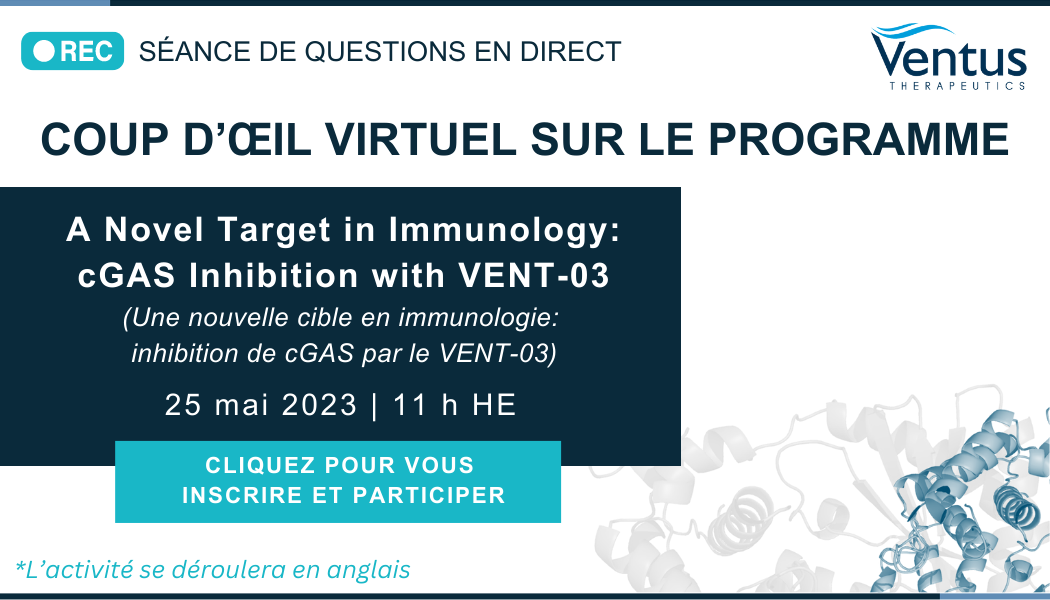Presentations at the 4th Inflammatory Skin Disease Summit and the American College of Rheumatology Annual Meeting describe newly identified cGAS inhibitors
WALTHAM, MA & MONTREAL, QC, November 3, 2021 – Ventus Therapeutics U.S., Inc., a biotechnology company that builds upon proprietary expertise in structural biology, protein science and its unique ReSOLVE platform to design small molecule therapies across a number of therapeutic areas, is presenting data for its cyclic GMP-AMP synthase (cGAS) inhibitor program this month at two upcoming conferences: the 4th Inflammatory Skin Disease Summit (November 3-6, 2021) and the American College of Rheumatology Annual Meeting, ACR Convergence (November 5-9, 2021). These presentations will highlight results that describe how Ventus’ proprietary technology and enablement could drive the design of chemically distinct cGAS-targeted small molecule therapeutics capable of addressing a wide range of indications.
Highlights of the data to be presented for the cGAS inhibitor program include:
- Identification of novel, highly selective and optimized cGAS functional inhibitors and their molecular interaction and binding modes solved by high-resolution co-crystal structures and the ReSOLVE platform;
- Capability of Ventus’ proprietary ReSOLVE platform to significantly advance understanding of the binding pocket, which allows pathway inhibition at nanomolar concentrations;
- Pronounced attenuation of production of type I interferons, cytokines and chemokines and significant reduction of T-cells infiltration in three prime repair exonuclease 1 (TREX1) deficient mice, a robust model of systemic auto-inflammation;
- Reduction of cyclic guanosine monophosphate-adenosine monophosphate (cGAMP) levels in skin biopsies from Ultraviolet B (UVB) exposed TREX1-deficient mice, demonstrating effects on UVB-induced cGAS signaling responses in a disease-relevant animal model.
“cGAS has been a challenging target for small molecule drug discovery and to our knowledge there is no cGAS inhibitor in clinical development,” said Michael Crackower, PhD, Chief Scientific Officer of Ventus. “Using our structural biology capabilities and the ReSOLVE platform, we solved the high-resolution co-crystal structure of cGAS in the presence of our novel binding compounds, and have optimized high affinity, selective and in vivo active compounds.”
“Aberrant inflammatory responses to cytoplasmic DNA have been linked to a wide range of inflammatory disorders, and cGAS has emerged as a key player in the initiation of such responses. Thus, we believe targeting cGAS has the potential to benefit patients suffering from a wide variety of diseases, ranging from monogenic diseases to complex inflammatory disorders and neurodegenerative diseases,” said Kelly Pike, PhD, lead biologist of the cGAS program and Head of Translational Sciences and Scientific Affairs at Ventus, who will present at ACR Convergence.
About cGAS
cGAS is a key regulator of the cGAS/stimulator of interferon genes (STING) pathway that, when activated, leads to a profound inflammatory response driven by anti-viral cytokines including Type I interferons. cGAS is a sensor of double-stranded DNA in the cytoplasm; cytoplasmic DNA can be indicative of infection, mitochondrial disease or nuclear leakage. Aberrant activation of cGAS/STING in humans leads to pro-inflammatory diseases, as demonstrated by certain genetic diseases (e.g. Aicardi Goutières syndrome) and certain idiopathic complex diseases such as systemic lupus erythematosus, cutaneous lupus and dermatomyositis. These diseases represent highly compelling opportunities for treatment with a cGAS inhibitor.
About Ventus Therapeutics
Ventus Therapeutics is a biopharmaceutical company utilizing cutting-edge computational tools to design small molecule therapeutics across multiple therapeutic areas, including immunology, inflammation and neurology. Our company builds upon proprietary expertise in structural biology and protein science and our unique ReSOLVE platform. ReSOLVE is designed to combine deep insight into how proteins move and adopt numerous conformations with a proprietary method for defining the solvation structure of the target protein and its binding pockets. This approach is designed to allow us to discover and characterize previously unknown pockets on the surface of proteins and rapidly identify small molecules that we expect to have optimal binding affinity for those pockets. Our differentiated approach aims to identify and develop new drug molecules for targets that have never been drugged and for other targets for which existing chemical matter leaves significant room for improvement. We are leveraging our team’s expertise in computational chemistry, structural biology, and drug development to advance a deep pipeline in innate immunity and beyond. Our lead programs target key innate immune modulators, including cGAS and NLRP3, and we have multiple targets under evaluation by our ReSOLVE platform. For more information, please visit www.ventustx.com and engage with us on Twitter @Ventus_Tx or on LinkedIn.
Forward-Looking Statements
This press release contains forward-looking statements about future expectations, plans and prospects, including, but not limited to, statements related to Ventus’ ability to identify and develop a pipeline of small molecule therapeutics for a number of therapeutic areas, the ReSOLVE platform’s ability to identify previously unknown binding pockets on the surface of proteins and small molecules that it expects to have optimal binding affinity for those pockets, the objectives and results of Ventus’ preclinical studies and anticipated therapeutic benefits of its future product candidates. These forward-looking statements are based on Ventus’ current expectations and inherently involve significant risks and uncertainties. Actual results and the timing of events could differ materially from those anticipated in such forward-looking statements as a result of these risks and uncertainties, which include, without limitation, the initiation, timing, progress and results of preclinical studies and clinical trials of its future product candidates; the results of Ventus’ earlier studies not being predictive of future results; ability to maintain and enhance the ReSOLVE platform and use it to effectively identify previously unknown pockets on the surface of proteins and small molecules that have optimal binding affinity for those pockets; ability to obtain funding for its operations and implement its business strategy; ability to meet regulatory standards, including any anticipated regulatory developments in the United States and foreign countries in which it may seek regulatory approval for its future product candidates; the impact of the COVID-19 pandemic on its business and efforts to address the impact on its business; anticipated developments related to its competitors and its industry; the performance of third-party service providers, including suppliers and manufacturers; and ability to obtain, maintain, protect and enforce intellectual property protection for its future product candidates and the ReSOLVE platform. Any forward-looking statements contained in this press release speak only as of the date hereof, and Ventus undertakes no duty or obligation to update any forward-looking statements as a result of new information, future events or otherwise.

